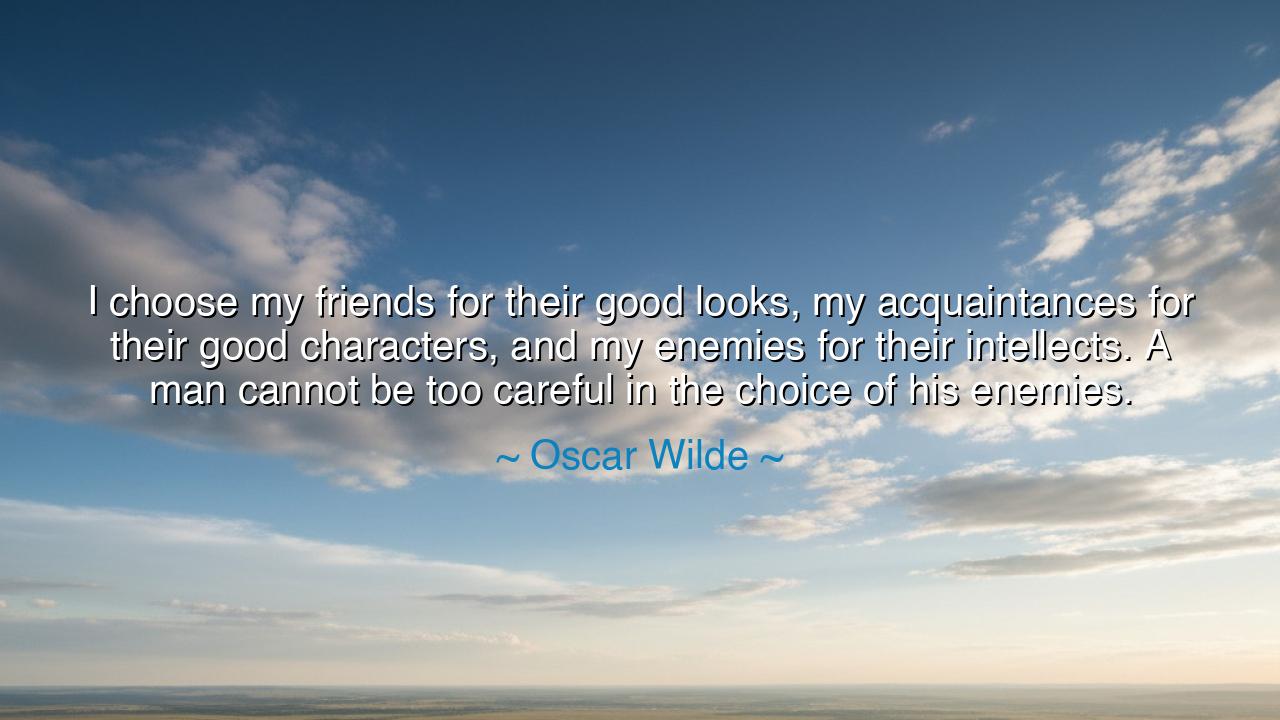
I choose my friends for their good looks, my acquaintances for
I choose my friends for their good looks, my acquaintances for their good characters, and my enemies for their intellects. A man cannot be too careful in the choice of his enemies.






The words of Oscar Wilde, that master of wit and paradox, echo like a bell in the corridors of human wisdom: “I choose my friends for their good looks, my acquaintances for their good characters, and my enemies for their intellects. A man cannot be too careful in the choice of his enemies.” In this sentence lies not mere irony, but a vision of how the soul must navigate the intricate web of human relations. Wilde, ever the observer of society’s masquerade, unveils a truth that the ancients knew well—that one’s friends, acquaintances, and enemies each hold a sacred purpose in the shaping of character.
In ancient days, men were judged not by the gentleness of their company, but by the nobility of their foes. Achilles was exalted because Hector was worthy; Alexander’s greatness was tempered by his war with Darius; and even Rome found glory in facing Carthage and Hannibal. For it is the strength of one’s enemy that measures the height of one’s own spirit. Wilde’s words, though bathed in irony, hide this timeless wisdom: to have an intelligent enemy is to be sharpened like steel against steel. A dull adversary brings no challenge, no growth, no illumination of the self. But a wise one—ah, such a foe awakens the hidden fires of greatness.
To choose enemies wisely is thus an act of self-mastery. It is to recognize that conflict is not ruin, but refinement. The mind stagnates without resistance, just as the sword rusts when left unsheathed. Wilde reminds us that life, in its most luminous form, demands opposition. The greatest figures of history did not blossom in ease—they were forged by intellectual battle, by dissent, by struggle with ideas and men as fierce as themselves. In this, one may recall the rivalry between Thomas Jefferson and Alexander Hamilton—two titans whose enmity shaped the very spirit of a nation. Their conflict of intellects gave birth to balance, to the living pulse of democracy, for one stood for liberty and the other for order, and the world was made richer by their strife.
Yet Wilde’s wit is double-edged. To choose one’s friends for their beauty is not to be shallow, but to honor the aesthetic of companionship—the joy of what is radiant and uplifting. Beauty, to Wilde, was not mere vanity; it was the mirror of divine harmony, a thing that stirs the heart toward higher forms of love. Acquaintances of good character provide the moral grounding of one’s social world—the quiet, stable presence that keeps the soul from drifting too far into chaos. But enemies of intellect—they are the fire in the crucible. They test, provoke, and ultimately reveal who we are beneath all masks.
There is a certain nobility in respecting one’s enemy. The warrior who despises his opponent falls into arrogance and blindness; the sage who studies his adversary learns wisdom and humility. History teaches that even in opposition, honor must be preserved. Consider Abraham Lincoln, who after the brutal years of civil war, urged mercy and respect toward the defeated South, saying, “With malice toward none, with charity for all.” His greatness lay not only in victory but in his capacity to see humanity in his enemies—to recognize that the battle of ideas, not hatred, was the true test of the intellect and spirit.
From Wilde’s paradox emerges a profound lesson: do not fear your enemies—cultivate them. Let them be mirrors that reflect your weaknesses, mountains that measure your strength, and storms that awaken your courage. Seek out adversaries who make you think, who challenge your beliefs, who sharpen your reason and cleanse your pride. For in the dance of opposition, the soul learns to stand tall. But beware of petty foes, for they drain without refining. The wise man, like a sculptor, chooses even his enemies with discernment.
And so, let this teaching be passed down: surround yourself with friends who inspire, acquaintances who steady, and enemies who elevate. If ever you must battle, let it be against minds worthy of your fire. When you meet resistance, meet it not with bitterness but with curiosity. Ask yourself—what strength is this conflict calling forth in me? Thus shall you live not as one adrift among faces, but as a soul that chooses with purpose—a builder of bonds and rivalries that shape destiny itself.
For truly, as Wilde whispers through the ages, a man cannot be too careful in the choice of his enemies. It is they, more than friends or fate, who reveal the measure of his greatness.






AAdministratorAdministrator
Welcome, honored guests. Please leave a comment, we will respond soon